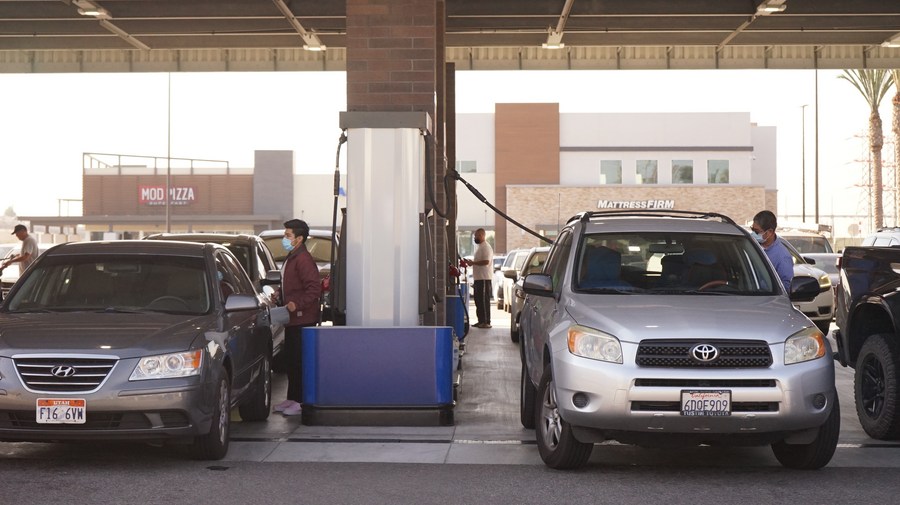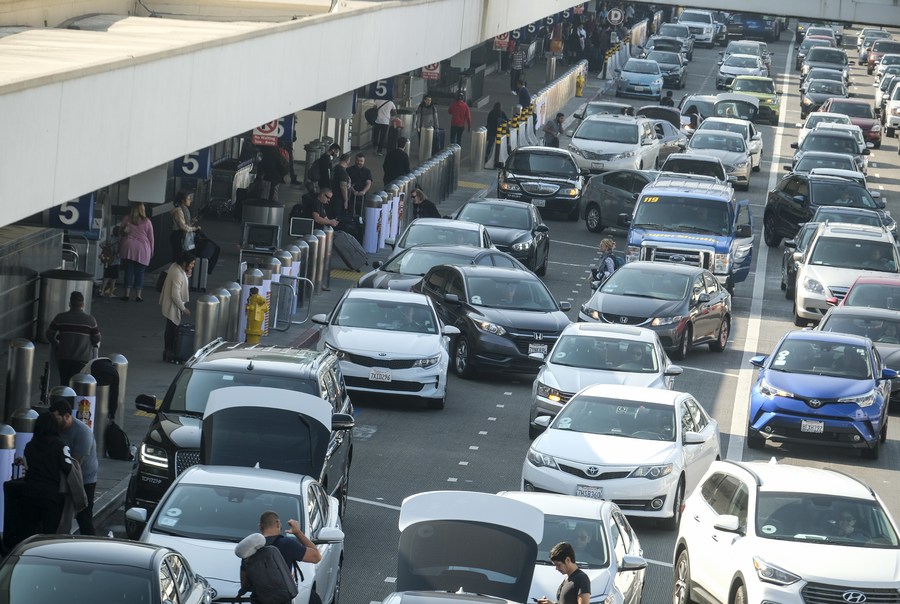
People fuel vehicles at a gas station in Los Angeles, the United States, on Nov. 15, 2021. (Photo by Zeng Hui/Xinhua)
California needs a waiver from the EPA which grants a state special standing to set stricter tailpipe emission standards for new vehicles than those established at the federal level.
SACRAMENTO, the United States, Feb. 29 (Xinhua) — California’s ambitious plan to phase out the sale of new gasoline-only vehicles by 2035 faces opposition from the U.S. auto industry, which raises concerns about feasibility and practicality in other states that have adopted the regulations.
The Alliance for Automotive Innovation (AAI), representing most major automakers, argued that the plan, while potentially achievable in California, may be unrealistic for other states due to factors like lower consumer demand and inadequate infrastructure.
The group expressed the concerns in its comment submitted to the U.S. Environmental Protection Agency (EPA) on Wednesday, the last day of the public comment period on California’s request for EPA’s waiver to implement the plan.
In August 2022, the California Air Resources Board (CARB), a state agency in charge of reducing air pollution, approved the plan to phase out vehicles that run only on gasoline by 2035. So far, 17 states have adopted these tailpipe emission rules.
However, California needs a waiver from the EPA which grants a state special standing to set stricter tailpipe emission standards for new vehicles than those established at the federal level.
While acknowledging California’s success in promoting electric vehicles (EVs), with the highest national market share of 26 percent in 2023 compared to the national average of 9.5 percent, the AAI argued that replicating this success across other states faces significant challenges.
Reaching the sales targets outlined in the plan would require a significant increase in EV adoption, according to AAI. They estimated that EV sales would need to more than double in all but one state adopting California’s rules, and triple in five.

Holiday travelers arrive at Los Angeles International Airport in Los Angeles, California, the United States, Nov. 20, 2018. (Xinhua/Zhao Hanrong)
The group pointed to “significant differences” between California and other states in terms of charging infrastructure and other supportive conditions to reach the requisite market acceptance levels.
“Public charging networks remain unable to keep up with charging demand in California and other states,” said AAI, and these are major concerns for perspective EV owners.
The auto industry group argued that these factors, largely beyond their control and varying greatly across states, make it difficult to achieve the same level of success with California’s regulations implemented outside of the state.
The American Petroleum Institute (API) also voiced strong opposition, calling California’s proposal “the ultimate regulatory intervention” that restricts consumer choice and increases reliance on foreign supply chains.
The CARB defended the plan, stating that the other states following their program “understand that clean cars improve public health and address a global challenge.”
A growing number of states are adopting California’s zero-emission vehicles regulations that are more stringent than what the federal government has proposed.
California’s rules require that 35 percent of the new cars sold in the state be either electric, plug-in electric hybrids, or hydrogen fuel cell by 2026. That proportion will rise to 68 percent by 2030 and 100 percent by 2035.
Among the 17 states that have adopted California’s rules, five will start the requirement in model year 2026, with the other 11 states beginning requirements in model year 2027. â

